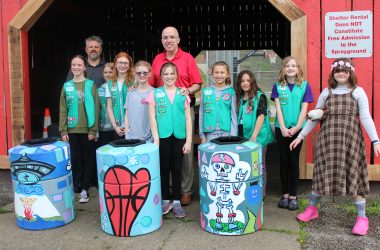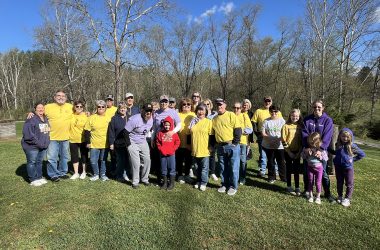Daniel 3:1, 8-18
All who have attended Sunday School from an early age know the story of Shadrach, Meshach and Abednego. Children know that the three young men were thrown into the fiery furnace because they refused to bow before the great image that Nebuchadnezzar built.
In Sunday School, children learn of Shadrach, Meshach, and Abednego’s faith in God. Children understand that the three young Hebrew men were saved from the fiery furnace because they placed their trust in God.
Adult believers possess deeper understandings than children. We know the reason that Shadrach, Meshach, and Abednego trusted God. We know that all believers are saved by grace through faith and that saving faith is a gift from God (Eph. 2:8). We know that Shadrach, Meshach, and Abednego were saved by grace through faith given to them by the Lord God.
New Testament believers know that saving faith results from having heard the word of God (Rom. 10:17). Was the faith that saved Shadrach, Meshach, and Abednego any different? Consider all that is known of the three men.
They came with Daniel to Babylon from Jerusalem following the conquest of the city by Nebuchadnezzar. The three were among those deemed to be “. . . skillful in all wisdom, and cunning in knowledge, and understanding science” (Dan. 1:4). If Shadrach, Meshach, and Abednego really possessed wisdom, knowledge and understanding, they knew why they were carried off to Babylon. They knew that “. . . the Lord rooted them out of their land in anger, and in wrath, and in great indignation, and cast the into another land” (Deut. 29:28). They had heard the word of God and had witnessed the curse placed upon Israel because the people turned from the Lord God. They also knew the promise of Deuteronomy 30:5-6. They knew that they would live if they loved the Lord with all their heart and with all their soul. They had heard the word of God and they believed.
We are introduced to the great idol without explanation in verse 1. The scriptures do not reveal Nebuchadnezzar’s motive for making this image of gold. The dimensions, ninety feet high and nine feet wide, and its location, in a plain, suggest that the king wanted the image to be seen by all.
The golden image would not have been pure gold (an idol consisting of pure gold the size of Nebuchadnezzar’s image would have weighed 179 tons and consist of gold valued at more than $10 billion in today’s currency). The image would have been fashioned from wood overlaid with gold. That said, it was no small project. It would have required months to construct. It is a project that would have involved many people.
The falling down of every member of the large assembly that had gathered before the idol at its dedication ceremony would have been a sight to behold. It was a scene which Nebuchadnezzar wanted viewed. It was a tribute to him.
The large assembly consisted of government officials from every corner of the Babylonian Empire (v. 3). Failure to bow and worship the image would result in that official being thrown into the flames of the fiery furnace — a public execution.
In verses 8-13, Nebuchadnezzar learned that Shadrach, Meshach, and Abednego did not fall before the idol and worship it. The accusers were Chaldeans (pagans); the accused were Hebrews (God’s chosen people). The Chaldean accusers phrased their words carefully. They made it known that Shadrach, Meshach, and Abednego were Jews. They described Shadrach’s, Meshach’s and Abednego’s action as an assault upon Nebuchadnezzar and the gods of Babylon.
Nebuchadnezzar reacted in a predictable manner. He was furious. He summoned the three Hebrews to come before him (v. 13). He demanded to know if the charges were true and he asked them if they were prepared to face the consequences of failing to bow down and worship the golden image. He, then, directed Shadrach, Meshach, and Abednego to identify the God “that shall deliver you out of my hands” (v. 15).
The three boldly declared “our God whom we serve is able to deliver us from the burning fiery furnace, and he will deliver us out of thine hand” (v. 17). The God whom Shadrach, Meshach, and Abednego served is the self-extistent God who spoke to Moses from the burning bush. He is the creator of the Earth, the moon, the Sun, and the stars. He is the God who is able to wrest whomever He chooses from the hand of the most powerful king in all the world.
Shadrach’s, Meshach’s and Abednego’s final words are most telling. They said they would not bow down and worship the golden image even if God were not to deliver them from the fiery furnace. Fear of death had no hold upon them. They were going to do that which God had commanded. They would not bow down. Their faith was like that of Abraham who believed that obeying God’s command to slay Isaac (Gen. 22:2) would not prevent God from fulfilling His promise of an everlasting covenant through Isaac (see Gen. 17:7, 21).
The three possessed the faith of Abraham. They possessed the faith that saves. Shadrach, Meshach, and Abednego believed as Abraham believed and were saved. New Testament believers, likewise, are saved because we believe as Abraham believed (see Rom. 9:6-8). Shadrach, Meshach, and Abednego declared their faith. Let us do likewise.



